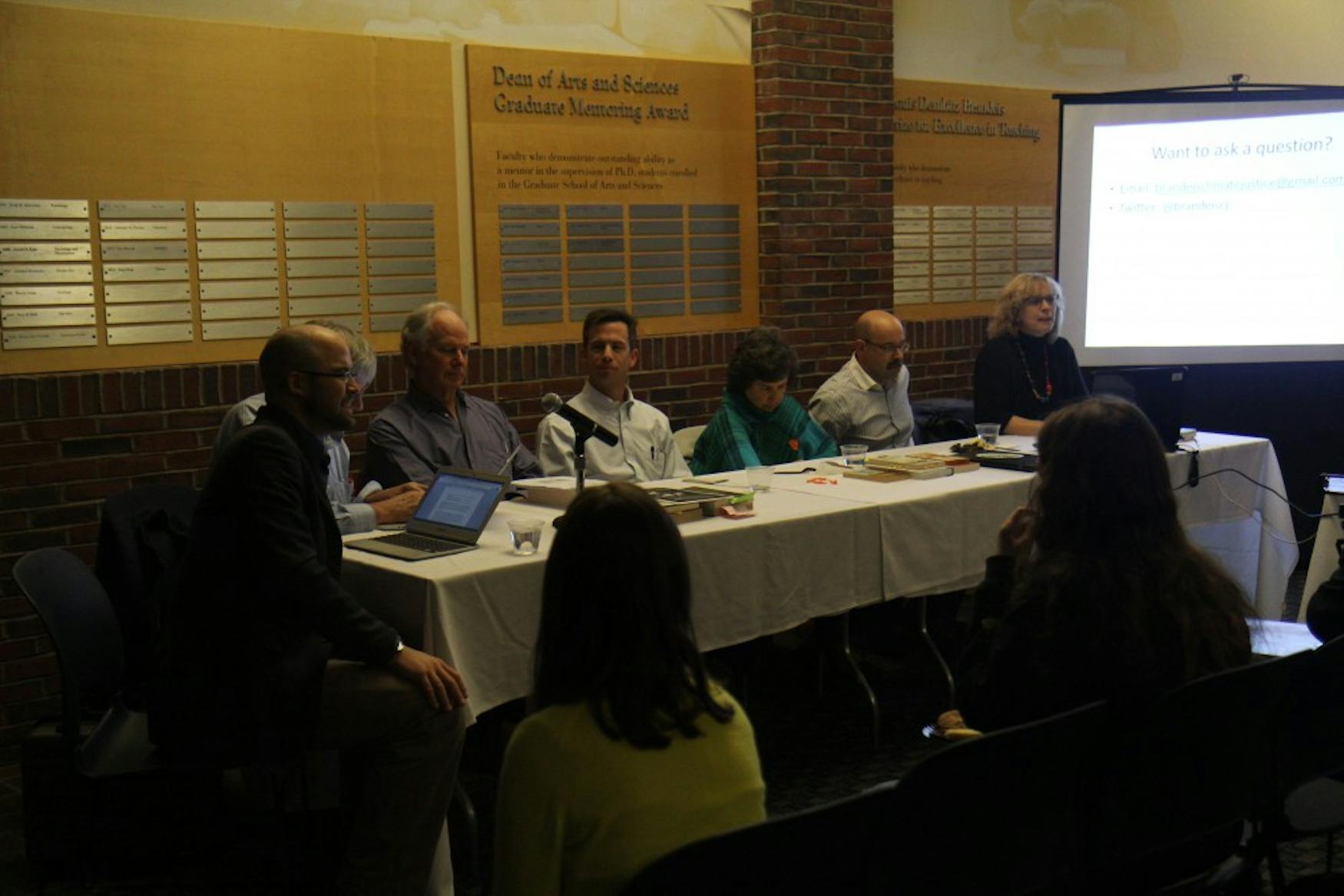Professors discuss fossil fuel divestment on panel
Six Brandeis professors gave their opinions on fossil fuel divestment, described the relationship between social justice and carbon emissions, and encouraged student-led solutions to climate change at a faculty teach-in yesterday.
The event came in the wake of the Nov. 1 release of the 2014 Intergovernmental Panel on Climate Change’s latest report on global greenhouse gas emissions and the People’s Climate March in New York City in September, at which a number of Brandeis students were arrested. According to the moderator of the event, doctoral candidate in History Philip Wight, the panel was held so that faculty experts could “illuminate the climate crisis and discuss practical solutions.” The panelists included professors from the University’s Undergraduate College of Arts and Sciences, the International Business School and the Heller School for Social Policy and Management. The panelists were Profs. John Ballantine (IBS), Charles Chester (ENVS), Judy Herzfeld (CHEM), Frank Lowenstein (ENVS), Eric Olson (Heller) and Sabine von Mering (GRALL).
The discussion began with a question that Wight posed for the panel: he asked that the professors provide an example of a current climate-change solution that has inspired them. Von Mering discussed the fact that Germany has raised a large amount of awareness in recent decades and has taken many steps to reduce their energy usage. Germany is now “the number-one solar country in the world,” or the country that uses the most solar power, said von Mering. There has been a dramatic increase in the use of German renewable energy since the introduction of the renewable energy law in March 2000, which gives tax credits and cheap loans to companies that invested in renewable sources, she added.
Lowenstein said that his inspiration was a 2008 California law, called the Climate Change Scoping Plan, which requires California to reduce its carbon emissions to 1990s-levels by the year 2050. Olson discussed Denmark’s recent announcement that they plan to become 100 percent renewable by the year 2050. According to Olson, the country is now at 40 percent renewable energy usage, and plans to electrify all transportation. He also cited the “incredible increase in United States academic research” as a potential for future change.
Wight then switched gears to talk about Brandeis and what the University and the students can do to create awareness of climate change and take action against it. When he asked the faculty if they “think climate change is a social justice issue,” they all firmly responded that it was. Von Mering said that “the people who are suffering the most from the consequences are the ones who are least responsible for it,” meaning that it is the developing countries that receive the negative impacts of U.S. and European greenhouse gas emissions.
Herzfeld stated that “social justice extends across generations,” and it is our responsibility to mitigate the effects for future generations. Von Mering also said that “if Brandeis takes its social justice seriously, then it must become a leader in fighting climate change, and that includes divestment from fossil fuels.”
When asked about potential solutions at Brandeis, including the proposal of divestment, the panel members gave a range of responses. Von Mering said she was in favor of the University divesting. Herzfeld said that although she does not necessarily think the University should use its endowment for political ends, the University needs to “be consistent with who we claim to be as a University.” Chester and Ballantine both focused on the importance of using “non-radical” language when trying to engage in climate change discussions but did not specify if they were for or against divestment. Olson said that while divestment is one potential option, he thinks that “Brandeis would have a very hard time divesting” because of the risks involved and the lack of control over endowment and what it goes toward.
According to Wight in an email to the Justice, the Brandeis Climate Justice group—formerly called the Brandeis Divestment Campaign—has been “organizing divestment for two years now.” Brandeis currently has about 10 percent of its endowment invested in the fossil fuel industry, although a divestment referendum last spring showed that 79 percent of the members of the student body who voted were in favor of divestment.
All the faculty members also said that students should play a role in how the University moves forward in addressing climate change. Lowenstein said that not only does the University need to be prepare students to be “solution-finders” in the future but that it also needs to “tap into” student creativity. “Every single major step forward…all started with protest,” Lowenstein said.
Lowenstein encouraged students to “protest” non-violently with “song, music, dance and art” in order to make a difference. Olson encouraged students to vote as often as possible, and Prof. Lawrence Wangh (BIOL) suggested from the audience that students should “ask what is not being taught.” Wangh said that many important topics related to climate change are not being taught at Brandeis, such as geology or engineering. “Students should demand to broaden their education in order to alter academic discussion,” Wangh said.
Von Mering concluded the meeting by encouraging students to ask questions, demand solutions and organize effectively. “Don’t underestimate the power you have,” she said. “Our biggest threat is silence.”
Wight wrote in an email to the Justice that while an official committee has been made to discuss the possibility of divestment at Brandeis, no clear conclusions have been made. The committee was formed last October, according to a Justice article from Oct. 1, 2013. Wight wrote that students are “preparing to escalate in the coming months if the University continues to drag its feet on this pressing moral issue.”



Please note All comments are eligible for publication in The Justice.